M6908
Myeloperoxidase from human leukocytes
lyophilized powder, ≥50 units/mg protein
Synonym(s):
MPO, Peroxidase, myelo
About This Item
Recommended Products
biological source
human leucocytes
Quality Level
form
lyophilized powder
specific activity
≥50 units/mg protein
solubility
H2O: soluble
aqueous buffers such as 50 mM sodium acetate: soluble (Freezing of the enzyme in solution may result in a substantial loss of activity.)
UniProt accession no.
shipped in
dry ice
storage temp.
−20°C
InChI
1S/H2O3/c1-3-2/h1-2H
InChI key
JSPLKZUTYZBBKA-UHFFFAOYSA-N
Gene Information
human ... MPO(4353)
Looking for similar products? Visit Product Comparison Guide
General description
Application
- as a standard to quantify the neutrophil (polymorphonuclear cell [PMN]) infiltration in lung tissue
- as a neutrophil extracelullar trap (NET) component to stimulate 106 dendritic cells or 106 macrophages
- as a standard in myeloperoxidase (MPO) assay to measure pancreatic MPO
Biochem/physiol Actions
Other Notes
Unit Definition
Physical form
Analysis Note
inhibitor
substrate
Storage Class Code
11 - Combustible Solids
WGK
WGK 1
Flash Point(F)
Not applicable
Flash Point(C)
Not applicable
Certificates of Analysis (COA)
Search for Certificates of Analysis (COA) by entering the products Lot/Batch Number. Lot and Batch Numbers can be found on a product’s label following the words ‘Lot’ or ‘Batch’.
Already Own This Product?
Find documentation for the products that you have recently purchased in the Document Library.
Customers Also Viewed
Our team of scientists has experience in all areas of research including Life Science, Material Science, Chemical Synthesis, Chromatography, Analytical and many others.
Contact Technical Service










